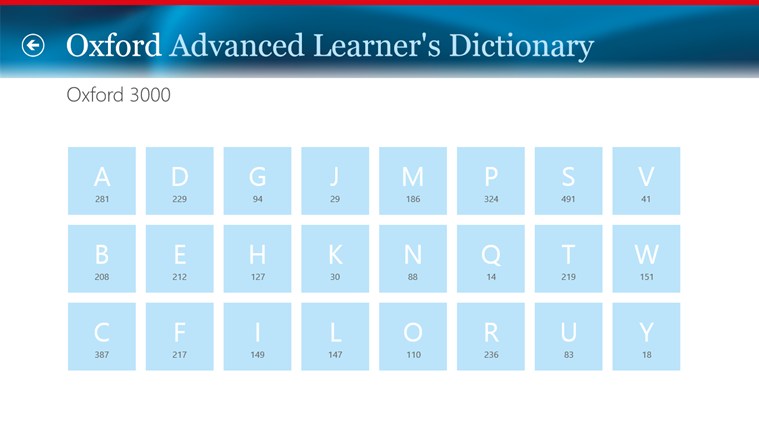
Frequency-based vocabulary lists like the Oxford 3,000 are powerful language learning tools. In fact, they are way too powerful to stay in the hands of teachers and EFL publishers. That’s why I give each of my students the Oxford 3,000 in an Excel or Numbers file, with empty columns for definitions, example sentences, word family information, collocations etc.
Focus tool
The Oxford 3,000 is a perfect tool for focusing students on studying vocabulary. A huge amount of research and work has gone into compiling this list of vital words for learners of English, and students can take advantage of this by checking if new words they come across in a text or a language activity are on the list. If a new word is in the list, I tell the students to learn it. If not, they have to decide if they feel that word is important enough to make the effort to learn it.
Ambitious and lazy students
Using the Oxford 3,000 is a great approach to vocabulary learning for ambitious students. The list becomes a guide where these students can focus on the words they really need to know to progress in English. And it is a focus tool that helps them become more independent as language learners.
Using the Oxford 3,000 is also a great tool for lazy students. They don’t have to make an effort to decide which words to focus on. If the word is in the list, they simply learn it.
Why an empty list?
I give my students an Oxford 3,000 list with no definitions or example sentences for the simple reason that finding the definition and typing it in the list helps the learner remember it. They are actively working with the new words, not simply looking up dictionary entries. And by actively adding and compiling the information, the Excel or Numbers file also becomes a personalised vocabulary record for the student.
How many words did you say?
A list of 3,000 words is incredibly long (my Excel file is 310 pages). It’s easy enough to find a new word in the list by using the Find function. However, to make the list easier to work with, I’ve also added a column labelled Date. Whenever a student has worked on a particular word, they simply add the day’s date at the end of the row.
You can then use the Sort function to sort the file according to date so that all the words the student has worked on that day jump to one place at the top of the page. (These functions work the same in a Numbers file).
What next?
There a lots of things you can do with the new vocabulary at the top of the Excel or Numbers file. For example, you can:
- Copy and paste the new words into a fresh Word file (landscape) and save it as a master file
The completed work in the Oxford 3,000 becomes a master copy - Remove the definitions in the master file and save it with a new file name
- Remove the head words and example sentences in the master file and save it with a new file name
- Remove the word family and collocations information in the master file and save it with a new file name
In this way, the learner creates three recyclable vocabulary worksheets with an answer key in less than two minutes. This is also great for learner independence.
Guiding students towards asking the right questions
You can use the Oxford 3000 file for homework, or as part of a vocabulary portfolio. The work can be graded, helping students develop their understanding of vocabulary learning through the grading system you use. Let’s look at an example:
| Student Work | Grade |
| The student has only entered definitions in their Oxford 3,000 list. | 60-65% |
| The student has entered a definition and an example sentence for each vocabulary item. | 70-75% |
| In addition to above, the student has added some word family words and/or some collocations. | 80-85% |
| In addition to above, the student has added multiple meanings/definitions with corresponding example sentences. They have added collocations, chunks, phrasal verbs, fixed expressions, opposites and/or synonyms. | 90-100% |
Using this kind of grading system for a vocabulary portfolio, I am indirectly helping my students ask key questions like, “But what is a collocation?” “How do I find phrasal verbs for this verb?” “Does fail have a noun?” “Which meaning of this word should I use?” “Is search engine a collocation?”
When I started using the Oxford 3,000 with my students three years ago, I wasn’t sure how students would respond to these activities. I found that they seem to like the routine and recognise the value of working with the Oxford 3,000 word list.
Sources
A 3-minute overview of the Oxford 3,000
For CEFR levels, the English Profile has been consulted
The vocabulary items in the example worksheets are from Douglas, Nancy. Reading Explorer 1. Heinle 2009 (page 15).
Bjorn Candel is currently teaching in the English Foundations Programme at Fujairah Men’s College in the UAE. He has been teaching English as a Foreign Language (EFL) for 17 years, primarily in the Middle East. He has a BA in English, Spanish and Linguistics, an MA in Translation and a Cambridge DELTA (British Council/International House). Special areas of interest include corpus-based research, vocabulary acquisition, the Lexical Approach, and mobile learning.